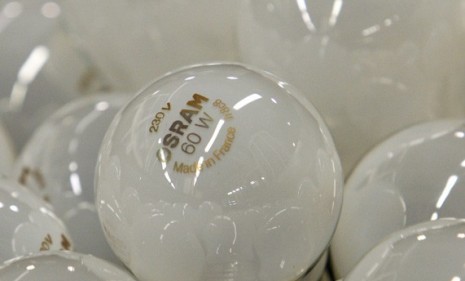Should the Feds ban incandescent light bulbs?
Thanks to a law passed in 2007 with bipartisan support, old-fashioned bulbs are due to disappear next year. Now the GOP wants to reverse that decision

A free daily email with the biggest news stories of the day – and the best features from TheWeek.com
You are now subscribed
Your newsletter sign-up was successful
In 2007, President Bush signed into law a widely supported energy bill mandating, in part, that light bulbs use 25 to 30 percent less energy starting in 2012, and 65 percent less energy by 2020. Some say the new standards would effectively ban traditional incandescent bulbs (or at least phase them out) in favor of compact-fluorescent (CFL) and LED bulbs, potentially saving billions in energy consumption. The bulb standards represent a "common-sense, bipartisan approach…," Rep. Fred Upton (R-Mich.) said in 2007. But GOP lawmakers have since flipped the switch, leading a charge against the new standards with a repeal measure known as the BULB Act, on which the House is expected to vote Monday. "The American people want less government intrusion into their lives, not more, and that includes staying out of their personal light-bulb choices," says Michele Bachmann (R-Minn.). Should the light-bulb legislation be repealed?
Yes, Americans should should have the freedom to choose: "When the government decrees what kind of light bulbs you can screw into the lamp in your own bedroom, even liberals [should] be nervous about the nanny state," says an editorial in The Wall Street Journal. The 2007 law was unwisely passed "at the height of the global warming fad-scare." Now, Republican lawmakers need to save Americans from the "light bulb police." Many consumers simply prefer incandescent bulbs for both aesthetic and health reasons. If CFL bulbs are really so superior, why does the government have to force people to use them?
The Week
Escape your echo chamber. Get the facts behind the news, plus analysis from multiple perspectives.

Sign up for The Week's Free Newsletters
From our morning news briefing to a weekly Good News Newsletter, get the best of The Week delivered directly to your inbox.
From our morning news briefing to a weekly Good News Newsletter, get the best of The Week delivered directly to your inbox.
CFLs are unsafe and typically produced in China: "This wicked law cannot be switched off soon enough," says Deroy Murdock in the Boston Herald. Not only are CFL bulbs aesthetically unappealing, they're also a health hazard — each bulb contains enough toxic mercury to pollute hundreds of gallons of water. And, "Washington's war on the Edison bulb" has cost hundreds of Americans their jobs, as bulb makers have shuttered incandescent plants across the country. Sure, "labor-intensive CFL production is thriving," but it's doing so in China.
Hold on — let's get the facts straight here: The efficient bulb standards would greatly lessen America's energy consumption, says Robert B. Semple, Jr. in The New York Times, save families hundreds of dollars each year, and reduce carbon dioxide pollution by 100 million tons. And though "freedom-fighters" like Rand Paul who support BULB act may think the government is infringing on personal liberty, the standards don't ban incandescent bulbs, they just require them to be more energy efficient. The new standards will give consumers more choices, instead of limiting them to "a technology essentially unchanged since Thomas Edison."
A free daily email with the biggest news stories of the day – and the best features from TheWeek.com
And, energy efficiency standards are good for the economy: Energy efficiency standards have long encouraged good, old fashioned American innovation, says Rep. Rush Holt in The Huffington Post, catalyzing everything from more efficient refrigerators to cars with better fuel economy. The light bulb standards could well encourage lighting companies to invest money in developing new technologies, something our flailing economy desperately requires. "Repealing the light bulb standards would thwart this progress and cost America jobs and money."
-
 Labor secretary’s husband barred amid assault probe
Labor secretary’s husband barred amid assault probeSpeed Read Shawn DeRemer, the husband of Labor Secretary Lori Chavez-DeRemer, has been accused of sexual assault
-
 Trump touts pledges at 1st Board of Peace meeting
Trump touts pledges at 1st Board of Peace meetingSpeed Read At the inaugural meeting, the president announced nine countries have agreed to pledge a combined $7 billion for a Gaza relief package
-
 Britain’s ex-Prince Andrew arrested over Epstein ties
Britain’s ex-Prince Andrew arrested over Epstein tiesSpeed Read The younger brother of King Charles III has not yet been charged